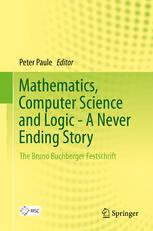
Mathematics, Computer Science and Logic - A Never Ending Story: The Bruno Buchberger Festschrift PDF
Preview Mathematics, Computer Science and Logic - A Never Ending Story: The Bruno Buchberger Festschrift
Peter Paule Editor Mathematics, Computer Science and Logic - A Never Ending Story The Bruno Buchberger Festschrift Mathematics, Computer Science and Logic - A Never Ending Story Peter Paule Editor Mathematics, Computer Science and Logic - A Never Ending Story The Bruno Buchberger Festschrift 123 Editor PeterPaule ResearchInstituteforSymbolic Computation JohannesKeplerUniversity Linz,Austria ISBN978-3-319-00965-0 ISBN978-3-319-00966-7(eBook) DOI10.1007/978-3-319-00966-7 SpringerChamHeidelbergNewYorkDordrechtLondon LibraryofCongressControlNumber:2013949176 ©SpringerInternationalPublishingSwitzerland 2013 Thisworkissubjecttocopyright.AllrightsarereservedbythePublisher,whetherthewholeorpartof thematerialisconcerned,specificallytherightsoftranslation,reprinting,reuseofillustrations,recitation, broadcasting,reproductiononmicrofilmsorinanyotherphysicalway,andtransmissionorinformation storageandretrieval,electronicadaptation,computersoftware,orbysimilarordissimilarmethodology nowknownorhereafterdeveloped.Exemptedfromthislegalreservationarebriefexcerptsinconnection with reviews or scholarly analysis or material supplied specifically for the purpose of being entered and executed on a computer system, for exclusive use by the purchaser of the work. Duplication of this publication or parts thereof is permitted only under the provisions of the Copyright Law of the Publisher’slocation,initscurrentversion,andpermissionforusemustalwaysbeobtainedfromSpringer. PermissionsforusemaybeobtainedthroughRightsLinkattheCopyrightClearanceCenter.Violations areliabletoprosecutionundertherespectiveCopyrightLaw. Theuseofgeneraldescriptivenames,registerednames,trademarks,servicemarks,etc.inthispublication doesnotimply,evenintheabsenceofaspecificstatement,thatsuchnamesareexemptfromtherelevant protectivelawsandregulationsandthereforefreeforgeneraluse. While the advice and information in this book are believed to be true and accurate at the date of publication,neithertheauthorsnortheeditorsnorthepublishercanacceptanylegalresponsibilityfor anyerrorsoromissionsthatmaybemade.Thepublishermakesnowarranty,expressorimplied,with respecttothematerialcontainedherein. Printedonacid-freepaper SpringerispartofSpringerScience+BusinessMedia(www.springer.com) Preface BrunoBuchbergerpassedthemilestoneofhis60thbirthdayonOctober22,2002. All the contributors to this book helped to celebrate this event, by presenting invited talks at the birthday conference “Logic, Mathematics and Computer Sci- ence-LMCS2002”presentedinProfessorBuchberger’srenovatedmedievalcastle at RISC in Hagenberg, Austria. Because of the superb spirit and the success of this symposium, the idea was launched to make these talks available to a larger audience.Aftermorethana decade,the planhasfinallycometrue,in the formof thiscollectionofmathematicalessays.Twoofthemarealmostunchangedversions of the LMCS2002 talks: Stephen Wolfram’s “New Directions in the Foundations of Mathematics” and Doron Zeilberger’s “Towards a Symbolic Computational Philosophy (and Methodology!) for Mathematics”. The essay “On the Role of LogicandAlgebrain SoftwareEngineering”byManfredBroyisa slightlyedited version of his LMCS2002 talk. Henk Barendregt significantly expanded his talk on “Foundations of Mathematics from the Perspective of Computer Verifcation”. In their mathematicalessence all these contributionsare still fully up-to-date,and theyrekindletheinspiringatmosphereoftheBuchbergerSymposium. I wantto take the opportunityto thankRalf Hemmeckefor editorialassistance and,lastbutnotleast,MartinPetersandRuthAlleweltfromSpringerfortheirhelp andalmostinfinitepatience. Hagenberg,Austria PeterPaule May2013 v Contents FoundationsofMathematicsfromthePerspectiveofComputer Verification........................................................................ 1 HenkBarendregt OntheRoleofLogicandAlgebrainSoftwareEngineering ................ 51 ManfredBroy NewDirectionsintheFoundationsofMathematics(2002).................. 69 StephenWolfram Towards a Symbolic Computational Philosophy (andMethodology!)forMathematics.......................................... 101 DoronZeilberger vii Foundations of Mathematics from the Perspective of Computer Verification HenkBarendregt ToBrunoBuchbergerindependentlyofanybirthday Abstract In the philosophy of mathematics one speaks about Formalism, Logicism, Platonism and Intuitionism. Actually one should add also Calculism. Thesefoundationalviewscanbegivenacleartechnologicalmeaninginthecontext of Computer Mathematics, that has as aim to represent and manipulate arbitrary mathematical notions on a computer. We argue that most philosophical views over-emphasizeaparticularaspectofthemathematicalendeavor. 1 Mathematics The ongoing creation of mathematics, that started 5 or 6 millennia ago and is still continuing at present, may be described as follows. By looking around and abstractingfromthenatureofobjectsandthesizeofshapeshomosapienscreated thesubjectsofarithmeticandgeometry.Highermathematicslateraroseasatower of theories above these two, in order to solve questions at the basis. It turned out thatthese moreadvancedtheoriesoften areable to modelpartof realityand have applications. By virtue of the quantitative, and even more qualitative, expressive forceofmathematics,everyscienceneedsthisdiscipline.Thisisthecaseinorder toformulatestatements,butalsotocorrectconclusions(Fig.1). H.Barendregt((cid:2)) NijmegenUniversity,Nijmegen,TheNetherlands e-mail:[email protected] P.Paule(ed.),Mathematics,ComputerScienceandLogic-ANeverEndingStory, 1 DOI10.1007/978-3-319-00966-7 1,©SpringerInternationalPublishingSwitzerland2013 2 H.Barendregt Fig.1 Thetriangleof (cid:129) mathematicalactivities Calculating Reasoning Computability Logic Math (cid:129) (cid:129) Defining Ontology The mathematical endeavor consists in a stylized way of three activities1: defining, calculating and proving.2 The three started in this order, but over the centuries they became more and more intertwined. Indeed, before one can do arithmetic,onehastohavenumbersandananalogousstatementholdsforgeometry. Havingnumbers onewantstoaddandmultiplythese;havingpolygons onewants to calculate their area. At some point the calculations became complex and one discoveredshortcuts.Oneroleofproofsisthattheyareanessentialtooltoestablish thecorrectnessofcalculationsandconstructions. 1.1 Egyptian-Chinese-Babylonianvs Greek Mathematics Differentappreciationsof thethree sidesofthe triangleofmathematicalactivities gaverisetovariousexplicitfoundationalviews.Beforeenteringintothesewewill argue that different implicit emphases on the sides of the triangle also did lead to different forms of mathematics. In the Egyptian-Chinese-Babylonian tradition emphasis was put on calculation. One could solve e.g. linear and quadratic equations. This was done in a correct way, but a developed notion of proof was lacking. In the Greek tradition the emphasis was on proofs. Using these one can p show that there are infinitely many primes, or that 2 is irrational, something impossibletodobymerecomputationalone.Buttherigorcomingfromgeometric proofsalsohaditslimitations.Euclid3[51]givesageometricproofthat.xCy/2 D x2C2xyCy2,butnosimilarresultsfor.xCy/3(althoughsucharesultcouldhave beenprovedgeometrically)or.xCy/4,letalone.xCy/n. 1IlearnedthisfromGillesBarthe(1996,personalcommunication). 2Theactivityofsolvingcanbeseenasaparticularinstanceofcomputing(orofproving,namely thatofanexistentialstatement9x:P.x/inaconstructivesetting). 3App.325–265BC.
